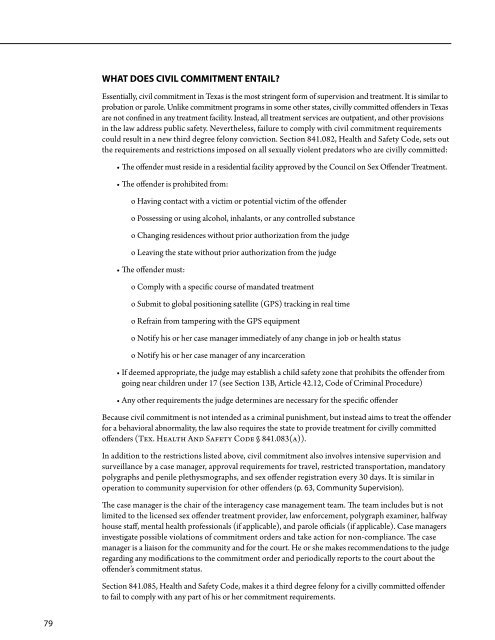Sexual aSSault LEGAL ADVOCACY MANUAL - Texas Association ...
Sexual aSSault LEGAL ADVOCACY MANUAL - Texas Association ...
Sexual aSSault LEGAL ADVOCACY MANUAL - Texas Association ...
Create successful ePaper yourself
Turn your PDF publications into a flip-book with our unique Google optimized e-Paper software.
What Does Civil Commitment Entail?<br />
Essentially, civil commitment in <strong>Texas</strong> is the most stringent form of supervision and treatment. It is similar to<br />
probation or parole. Unlike commitment programs in some other states, civilly committed offenders in <strong>Texas</strong><br />
are not confined in any treatment facility. Instead, all treatment services are outpatient, and other provisions<br />
in the law address public safety. Nevertheless, failure to comply with civil commitment requirements<br />
could result in a new third degree felony conviction. Section 841.082, Health and Safety Code, sets out<br />
the requirements and restrictions imposed on all sexually violent predators who are civilly committed:<br />
• The offender must reside in a residential facility approved by the Council on Sex Offender Treatment.<br />
• The offender is prohibited from:<br />
o Having contact with a victim or potential victim of the offender<br />
o Possessing or using alcohol, inhalants, or any controlled substance<br />
o Changing residences without prior authorization from the judge<br />
o Leaving the state without prior authorization from the judge<br />
• The offender must:<br />
o Comply with a specific course of mandated treatment<br />
o Submit to global positioning satellite (GPS) tracking in real time<br />
o Refrain from tampering with the GPS equipment<br />
o Notify his or her case manager immediately of any change in job or health status<br />
o Notify his or her case manager of any incarceration<br />
• If deemed appropriate, the judge may establish a child safety zone that prohibits the offender from<br />
going near children under 17 (see Section 13B, Article 42.12, Code of Criminal Procedure)<br />
• Any other requirements the judge determines are necessary for the specific offender<br />
Because civil commitment is not intended as a criminal punishment, but instead aims to treat the offender<br />
for a behavioral abnormality, the law also requires the state to provide treatment for civilly committed<br />
offenders (Tex. Health And Safety Code § 841.083(a)).<br />
In addition to the restrictions listed above, civil commitment also involves intensive supervision and<br />
surveillance by a case manager, approval requirements for travel, restricted transportation, mandatory<br />
polygraphs and penile plethysmographs, and sex offender registration every 30 days. It is similar in<br />
operation to community supervision for other offenders (p. 63, Community Supervision).<br />
The case manager is the chair of the interagency case management team. The team includes but is not<br />
limited to the licensed sex offender treatment provider, law enforcement, polygraph examiner, halfway<br />
house staff, mental health professionals (if applicable), and parole officials (if applicable). Case managers<br />
investigate possible violations of commitment orders and take action for non-compliance. The case<br />
manager is a liaison for the community and for the court. He or she makes recommendations to the judge<br />
regarding any modifications to the commitment order and periodically reports to the court about the<br />
offender’s commitment status.<br />
Section 841.085, Health and Safety Code, makes it a third degree felony for a civilly committed offender<br />
to fail to comply with any part of his or her commitment requirements.<br />
79
















